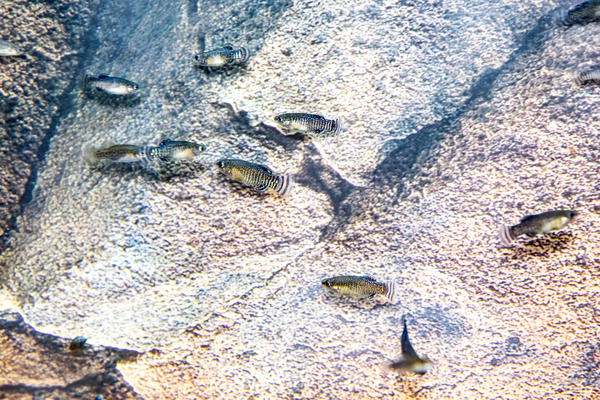Fundación Barcelona Zoo and Damm return Aphanius iberus to its natural habitat

The collaboration between the organizations has enabled the release of a select group of this species of Mediterranean fish declared endangered, thus reaching a total of 239 specimens returned thus far in the last year
Fundación Barcelona Zoo and Damm will collaborate on a new conservation project to protect endangered species. The initiative is part of the educational plan "Salvemos el Fartet" (Save the Aphanius iberus) and it has enabled the return of a select group of this species in the Llobregat River delta, thus reaching a total of 239 specimens returns thus far in the last year. The fish species native of the Mediterranean Sea is a biodiversity indicator in the region, and it was declared and endemic endangered species due to the dramatic fall in its population in the las years.
This effort is part of the agreement both organizations signed last May to drive, promote and jointly participate in efforts to protect biodiversity and, especially, native fauna of the regions where the company operates. It also shows are strong commitment with sustainability and the care for our environment. The Consortium for the Protections and Management of Natural Spaces in the Llobregat River delta has given its essential endorsement and support for the project.
Fundación Barcelona Zoo promotes the preservation of biodiversity, research and awareness on protecting and preserving ecosystems and through this direct collaboration Damm has strengthen its commitment towards preservation. A key component of the brewery's sustainability strategy is protecting native fauna of the regions where it operates.
Sustainability and our commitment with caring for and preserving our environment are instrumental pillars of Damm's identity since its inception, through efforts like reducing our impact on the environment, the fight against climate change and the protection of biodiversity.
Committed with our environment and its ecosystems
As part of its work towards achieving its Sustainable Development Goals for 2030, the brewery has already been part of renowned initiatives promoting the conservation of endangered species. The projects protecting other endemic endangered species in collaboration with Fundación Barcelona Zoo are proof of this. Both organizations have successfully returned two endangered species to their natural habitats, the Alytes muletensis or ferreret, an amphibian native to the Mallorca mountain of Tramuntana, and the Aphanius iberus or fartet, a species of fish native to the Mediterranean Sea. Balancing these species' population was possible thanks to these two projects, which prevented their extinction.
Also, in line with its commitment towards positive development within society and reducing the impact on the environment, the company has driven, through its volunteer work plan, reforestation projects in several areas of Murcia, El Prat de Llobregat (Barcelona). Also, on Beach World Day, Damm's employees took part of a campaign promoted by the company to pick up trash along the beaches.
Ten years commitment for the return of the fartet
Fundación Barcelona Zoo has a decade-long commitment towards de return of the fartet, and it has collaborated with the Consortium for the Protection and Management of Natural Spaces in the Llobregat River delta since 2018 to return the species to its natural habitat. Damm joined its support to this collaboration in 2021.
This plan's goal is to recover the fartet in the Llobregat River delta through the creation of new populations in several wetlands that will ensure the species viability in the long term. To this end, Fundación Barcelona Zoo and the Consortium promote the captive breeding of the species with actions aimed at improving their habitat and by studying their evolution over time.
The first step to improve their natural habitat took place in February 2019, through the excavation of a 200 sq. meters pond in the Can Camins pine forest, part of El Prat de Llobregat. The results were so good that two more ponds with the same characteristics will be excavated along this year and the next.


